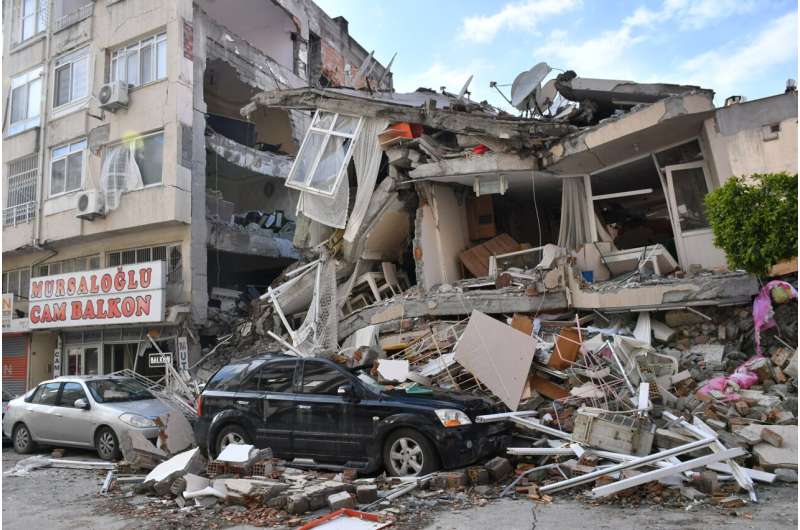In Turkey, women are feeling the worst aftershocks of the earthquake, which could lead to dwindling trust in government

When natural disasters strike, women and girls tend to experience disproportionate challenges and heightened risks.
They are much more likely than men to experience sexual violence and health problems. Women and girls also face greater professional and educational setbacks.
So it should come as no surprise that challenges continue to mount for women in Turkey and Syria following a 7.8 magnitude earthquake on Feb. 6, 2023, that killed more than 50,000 people and displaced 3 million people.
Earthquake survivors in Turkey also include 356,000 pregnant women who, at the end of February 2023, urgently needed medical care, according to the United Nations. Some women have had to give birth to their children in collapsed buildings.
Women are also more likely than men to be left out of government policies and programs responding to the disaster, often forcing them to migrate away from disaster zones. Death rates are higher during disasters for women even in some cases of rich countries, due in part to such factors as women not wanting to leave the home during an emergency.
We are scholars of human rights and political science. It is important to keep in mind that as natural disasters take a disproportionate toll on women, these crises also tend to shift women’s political attitudes. While the disproportionate impact of disasters on women has been well documented, a lesser-known imbalance is how such crises tend to shift political attitudes.
Research shows that women’s trust in government declines after a natural disaster, while men’s political trust increases—in both poor and rich countries.
In countries like Turkey with multiple disasters a year, studies show that women’s trust in government will likely decline over time. This includes their trust in government institutions, as well as their trust in those with power in government—political leaders, parties and parliament. When women do not see those in power as meeting their needs and trying to support and protect them, their trust wanes.
Why women are more vulnerable post-disaster
There are a few main reasons why women tend to feel the worst effects of a natural disaster.
First, societal expectations placed on women as the main caretakers in the household in both more and less economically developed countries are exacerbated following a disaster.
Women are often tasked with collecting and carrying food and water to their families, for example, as well as tending to their children and other family members. Women’s responsibilities as the primary caretaker often place them in dangerous settings after disasters, either traveling through rugged terrain to reach water and food or staying in unstable housing structures to cook and help their families.
Second, governments tend not to prioritize women’s particular health needs. Pregnant or nursing mothers may be unable to receive routine care, leading to an increase in risk of death or disease to both mother and baby.
While there are some international relief groups and projects that focus on providing menstrual health care to women following a disaster, this kind of response is not common.
Third, women are more likely to be living in poverty, with fewer economic alternatives than men following a disaster. They are slower to return to work, if they can at all, and are often denied government relief under the assumption that their husbands will support them. This further decreases women’s overall safety.
A series of earthquakes in Turkey
Following the February 2023 earthquake, advocacy groups and relief response agencies voiced concern that women and girls in Turkey were left in hastily constructed refugee camps that did not have access to safe bathrooms, clean water or period products.
Women and especially young girls living in temporary shelters are at a higher risk of gender-based violence and early child marriage, according to humanitarian agencies like Plan International. This is especially true if women do not have designated areas separate from men—as is the case in Turkey.
The Turkish advocacy group The Women’s Coalition has asked the government to remove preexisting obstacles to supporting women, like ending bans on popular social media sites.
This is because social media can play a vital role in coordinating relief and rescue efforts, and these bans are actively keeping women and LGBTQ organizations from connecting with people and providing assistance in earthquake-affected areas.
Women and girls may also be wary of asking male relief workers for help with their reproductive needs. Hesitancy to ask for help from male workers extends beyond reproductive needs.
Women’s rights activists in Turkey have said that women who were caught naked or without headscarves under the rubble were less likely to ask for help or rescue out of fear.
Understanding the political ramifications
People’s trust in the government in Turkey is generally low, and data demonstrates that Turkey could be doing significantly more with its available resources to guarantee respect for human rights overall. For example, recent reports by human rights groups indicate that Turkish authorities do not always enforce laws preventing domestic violence, which is common in the country.
Since people’s trust in politics and government is shaped by lived experiences, we think that solutions to prevent a decline in trust logically involve minimizing the experiences that cause the decline. While governments can’t control natural disasters, they can ensure that their responses are more inclusive of women’s needs.
This article is republished from The Conversation under a Creative Commons license. Read the original article.![]()
Citation:
In Turkey, women are feeling the worst aftershocks of the earthquake, which could lead to dwindling trust in government (2023, March 31)
retrieved 31 March 2023
from https://phys.org/news/2023-03-turkey-women-worst-aftershocks-earthquake.html
This document is subject to copyright. Apart from any fair dealing for the purpose of private study or research, no
part may be reproduced without the written permission. The content is provided for information purposes only.
For all the latest Science News Click Here
For the latest news and updates, follow us on Google News.

